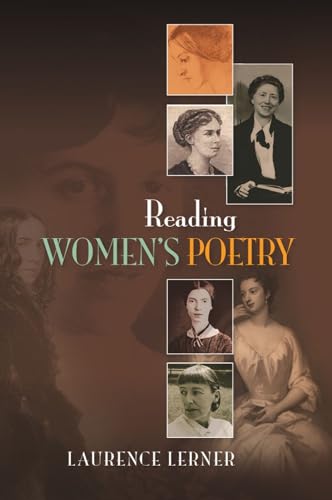Verwandte Artikel zu Reading Women's Poetry

Zu dieser ISBN ist aktuell kein Angebot verfügbar.
Alle Exemplare der Ausgabe mit dieser ISBN anzeigen:
Críticas:
"Do we read poem X because it's a good poem, or because its revealing of its author's marginalised status? To Laurence Lerner, both are good reasons for reading it, and no harm is done to poetry by attention to matters outside the ordinary scope of critical judgement. Lerner is a born teacher and his book evokes the ideal classroom discussion. He is wonderfully knowledgeable and he reads the poems with insight, skill and enthusiasm, but we are also encouraged to think for ourselves and take pleasure in what we read. Reading Women's Poetry is an immensely stimulating book." --Clive Wilmer, Sidney Sussex College, Cambridge, author, The Mystery of Things "Laurence Lerner, poet, novelist and critic, offers an enjoyably readable survey of poetry by women, ranging from the famous to the neglected. Reading Women's Poetry is engagingly informative, warmly responsive and incisively analytical. Lerner is lucid, provocative and entertaining." --Cedric Watts, Sussex University, author, Literature and Money and The Deceptive Text "Addressing an audience that is educated but not necessarily scholarly - that reads poetry purely for pleasure - poet, novelist, and critic Laurence Lerner emphasizes his dislike of literary theory and approaches poems as a poet and teacher. This book is not the ultimate word on female poets, nor does the author intend it to be. Rather, it serves as an introduction. Lerner selects a variety of poets from the 17th to the 20th centuries and includes both well-known and neglected examples. Among the neglected poets are some gems - e.g., Hetty Wright (John Wesley's errant sister) and Victorian radical Mathilde Blind. The author also presents examples of what he considers to be bad poems and compares them to similar but superior poems (perhaps coincidentally all by men). Lerner takes the same personal approach to poetry Edward Hirsch does in How to Read a Poem: And Fall in Love with Poetry (CH, Jan '00, 37-2605). Both books seek the same audience, but Lerner's often-judgmental approach differs from Hirsch's open and contemporary approach. Still Lerner has much to offer, especially in his discussion of canonical poets like Emily Dickinson and in his brilliant responses to his contemporaries, e.g., Sylvia Plath. Recommended." --Choice
Reseña del editor:
Until quite recently, anthologies of English poetry contained very few poems by women, and histories of English poetry gave little space to women poets. How should poetry lovers respond? The book begins by suggesting four possible responses: the conservative, which claims that women have not written many good poems; individual recuperation, which salvages some fine poems by women but without altering the general view of English poetry; alternative canon, which claims that women do not write the same kind of poetry as men, so that their work should be judged by different standards; and cultural recuperation, which claims that women's poetry is a significant cultural phenomenon, and should be read and studied without subjecting it to any tests. All these positions can be defended, and this book has elements of them all. As the title indicates, this book is about reading women's poems, rather than forming theories about them: it explores the experience of reading Aphra Behn, Elizabeth Browning, Christina Rossetti, Emily Dickinson and many others. Beginning with Katherine Philips, the first Englishwoman to achieve fame as a poet, it covers three centuries to the work of Marianne Moore and Stevie Smith, but does not include the many living women poets who deserve a volume to themselves. In order to discuss adequately the work of those included, it was necessary to omit many other women poets: the selection has been made on merit, and to readers who miss some of their favourite poets the only answer can be that the book does nothing to discourage reading other poets. Indeed, it is hoped that the form of discussion of the selected poems will be helpful in engaging further with women poets of all calibres. Do women write differently from men? The author assumes no predetermined answer but is very willing to ask the question; and in order to do so he frequently compares poems by women with poems by men, not so much to ask who writes better as to explore similarities and differences: thus Lady Mary Wortley Montagu is discussed along with Alexander Pope, Emily Dickinson along with Gerard Manly Hopkins and Elizabeth Browning along with her husband. Poems by women should be read, enjoyed, and argued about. They can be related to the time they were written and first admired, or to our views on women's history, or to our expectations of what poetry can offer -- but above all they should be enjoyed. And that is the faith in which this book is written.
„Über diesen Titel“ kann sich auf eine andere Ausgabe dieses Titels beziehen.
- VerlagLiverpool University Press
- Erscheinungsdatum2009
- ISBN 10 1845193342
- ISBN 13 9781845193348
- EinbandTapa blanda
- Anzahl der Seiten194
Neu kaufen
Mehr zu diesem Angebot erfahren
EUR 27,51
Versand:
EUR 5,23
Von Vereinigtes Königreich nach USA
Beste Suchergebnisse beim ZVAB
Reading Women's Poetry
Verlag:
Liverpool University Press 2009-08-05, Brighton
(2009)
ISBN 10: 1845193342
ISBN 13: 9781845193348
Neu
paperback
Anzahl: > 20
Anbieter:
Bewertung
Buchbeschreibung paperback. Zustand: New. Language: ENG. Artikel-Nr. 9781845193348
Weitere Informationen zu diesem Verkäufer | Verkäufer kontaktieren
Neu kaufen
EUR 27,51
Währung umrechnen

